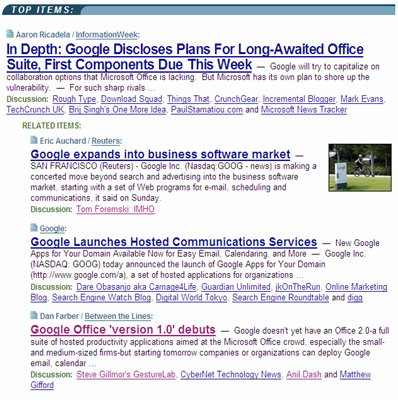Blogswarm on Google Apps for Your Domain

Last night's relatively big scoop, given to a few media outlets, was Google throwing together a bunch of its communications applications and making them available as a suite of services for companies and organizations. Subsequently, Google will add Spreadsheets, Writely and other applications to fill out the suite and offer both ad supported and subscription-based models.
The news plays into the Microsoft Office is dead taunt from Steve Gillmor, which posits that a new class of applications born of the Web will displace the mighty Office franchise. What's true is that there are several signs that Web-hosted, software-as-a-service productivity applications are for real, but not that Office or Microsoft is dead...at least not yet. Anil Dash provides some reasoned context for the Google Apps for Your Domain:
Google Apps is going to mirror that adoption, and wil take hold primarily in organizations where the culture isn't based around an existing process of mailing Word memos as attachments, but instead on IMing links to relevant resources. Most growing companies will have to manage a mixed environment where many core services are hosted, but in an informal, ad-sponsored model instead of the structured ASPs that large enterprises use. And they'll be managing heterogeneous application suites, where a primary provider like Google, Microsoft, or Yahoo will be augmented by one or two small vendors who either provide unique features or distinct vertical applications.
Google has a significant challenge on its hands, since a lot of small business owners know Google only as "the search company". Much of the trade press or reviews will describe Google Apps in the context of Microsoft Office, which should only serve to further confuse its intended audience. That being said, the individual components are already successes, to varying degrees. This means the question now is how well Google's brand can make the transition in the minds of mainstream users from being an information provider and advertising venue to being a reliable provider of business application services.
Nick Carr sums up the Microsoft-Google competition as follows:
The competition will raise challenges for both companies, posing a particular threat to Microsoft's traditional and very lucrative software-pricing structure. But the biggest threat is to neither Google nor Microsoft but to every other company hoping to get a foothold in the broad market for personal productivity applications. The combined might of the two companies, with their vast user bases and their billions of dollars in annual investments in infrastructure, should put a chill, and probably a fatal one, into any other company looking to enter this market. Entrepreneurs and their investors, in particular, will not be eager to battle the de facto Google-Microsoft axis.
Let's not forget that Microsoft Office Live is similar to what Google is now offering with Apps for Your Domain.
Scott Karp thinks that Google is gunning directly for Microsoft's enterprise business, and Kent Newsome suggests that Google will not crack corporate America any time soon, but can make inroads from the bottom up:
As I have said many times, corporate America is not going to embrace online applications and storage for a long time- privacy, security, fear of a bad decision, and confidentiality requirements ensure that. But the more individuals and small businesses that opt for Google's free alternatives, the bigger Google's toehold is- both in the office productivity space and in connection with its master plan to be the keeper of all of our data.
Now on to the way Google rolled out the story. As Robert Scoble pointed out in his post this morning, news of Google Apps originated with the New York Times, InformationWeek and a few I might have missed, who were briefed by Google. It's like Google's PR team handing out gifts to a few selected reporters. I have been the lucky recipient of such gifts during my years as a journalist, and I thoroughly enjoy getting the scoops--but that was when a company had one handful of choices, not a dozen key outlets, to spread the word. Surely Google could get its executives to talk to ZDNet, TechCrunch, GigaOm (Om didn't like the privacy disclosure) and the various Google topnotch bloggers prior to the announcement.
Today the bloggers are swarming all over the story (see TechMeme), providing insight way beyond the A,B,C facts presented in news stories (at least Aaron Ricadela did a solid reporting job on the InformationWeek story). Maybe Google management is arrogant enough to think the blogosphere will just do its job, satisfied with the scraps for second day takes. That may be right, but it doesn't seem like a good way to encourage conversation with an increasingly influential and knowledgeable constituency...
